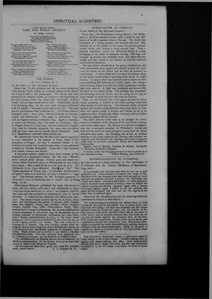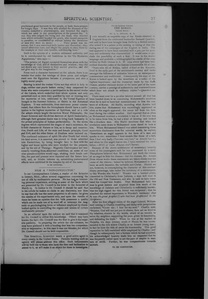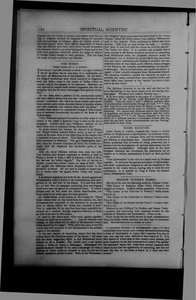< The Supersensual World (continued from page 1-157) >
...
The Koran (1)
To the Editor of The Spiritual Scientist:
Dear Sir: To the excellent and all too short article on “The Koran,” by H. Tuttle, in a recent number of the Scientist, I beg to add a few paragraphs. The Koran was first printed in the original Arabic, at Venice, at the beginning of the 16th century, under the short title “Alcoranus Aribice Venet,” but no copy seems now to exist. Hinkelmann edited it in Hamburg 1694. In the year 1698 Maraccius followed with his edition: “Alcorani textus universus,” &c. The next was by the Russian Emp. Calharina 11.:” Al Koran Arabice, Petropoli, 1787." Anno 1829: “Muzihi-el-Koran in Calcutta; Arabic and Hindustani.” The same in Serampore 1833; with an English version, Cawnpore 1834. Again at Calcutta, in Arabic and Persian, 1831; the same at Cawnpore, 1835. G. Flugel edited it in 1834, Lips. Another followed in Leipsic 1837; and in Calcutta appeared, the same year, an edition with two Pers. com. and an interlin Hindi translation. Note to J. Muchleisen—Arnold's Bible and Koran.
Mr. Arnold also states that the first Latin version appeared in 1143; translated at the request of Peter, abbot of the monastery at Chugui; but that it remained hidden in the cloisters for nearly four hundred years when it was published at Basle by Theodor Bibliander. From this it was rendered into Italian, German and Dutch.
A very poor opinion seems to have been formed of this translation as it appeared at Basle. Its title was: “Machumetis saracen princ ipseque Alcoran quae aute annos nccc Petrus Abbas Cluriran censis ex Arab lingua in Lat. transferri curan. Haec omnia in un vol. red. sunt op. et st. Th. Bibliandri Eccles Tigue Ministri. Basil. 1543. Fol.” The Italian appeared at Venice 1547: “L'Alcorano di Macometto nel qual si contie ne la dottrina. la vita, i costurni e i legge sue." The German version, by Sal. Scweiger, appeared in 1616, and in 1623 at Nurnberg, and in Dutch 1641 at Hamburg. id. id.
The learned Maraccio published his work (the Koran in Arab, and Lat. version, with notes and refutations) in 1644: "Alcorani texius universus ex correct," etc. Patavie 1698 Fol. The Latin part was published in Germany in 1703, by David Nerreter. A Latin one was edited by Chr. Reineccius, Lips. 1721. The oldest French version was by M. du Ryer, Paris 1647; and this became the parent of several other translations into English, Dutch, and German: —Ross' English version, London 1649, 1688; Glazemaker’s Dutch 1698; Rotterd and G. Lange’s at Hamburg. Mr. Savary published his French translation in 1783 Paris; and M. Kasimirzki his, including remarks on Musulman civilization, &c., 1840 Paris. Sale’s Koran, published first in 1734, is the most noted among us; but is considered defective as its suras are not, as in the original, divided into verses. This was rendered in German by T. Arnold. The first German version from the original was by Prof. Megerlin, and is divided into verses. In 1773 Boysen’s new translation appeared in Germany, with notes. Wahl revised and corrected it and added a valuable introduction (1828). Two new versions have appeared, one by Ulmann, in German; one by Rodwell, in English (1865).
The commentaries by Moslem doctors are as numerous as Biblical commentators. Of the former there are no less than 20,000 of them in the library at Tripolis.
All the important facts here given are from Mr. Arnold's work, quoted above.
The Koran (2)
I saw recently an exquisite copy of the Koran obtained in England from the celebrated bookseller Bernard Quaritch, and said to have teen brought from Delhi by a British soldier who seized it in a palace at the sacking or taking of that city during one of the campaigns of the English in India. The text appeared to have been executed with a pen, yet the accuracy and uniformity that characterized it would seem to preclude the possibility of such a feat. It was in the Arabic language and probable a relithographed fac-simile of the copy- written by Hafir Osman in A. H. 1094 which had been transcribed from the codex of the famous commentator Ali al Cari.
“Naru edin Ali of Mekka, called el-Kari or the Koranist, lived in the early part of the seventeenth century and ranks amongst the followers of orthodox Islam as an unsurpassed commentator and traditionist. Consequently his copy of the Koran is looked upon by the muselmen as a codex of the highest importance; and the transcript made by the Hafiz Osman, another eminent doctor of the latter part of the same century, carries a prestige of authenticity and trustworthiness which does not attach to ordinary copies.”—Quaritch cat. 300, 1875.
There must ever be a peculiar interest around all that has been handed down to us concerning Mahommed’s condition when he is said to have had communicated to him the contents of el-Koran. Ali Halibi, recording what Ayesha told him, states that Mohammed was exceedingly oppressed as often as the angels appeared; the sweat fell from his forehead during the coldest weather. Zaid reported that as often as Mohammed received a revelation it was as if his soul was to be taken from him, he had a kind of fainting and looked like a drunken man. Abu Hariri mentions that when the revelation came down to Mohammed none dared to look at him. When Mohammed himself was asked concerning these mysterious disclosures from {he celestial world, he replied, “Sometimes an angel appears in the form of a man and speaks to me; sometimes I hear sounds like those of a bell, then I feel very badly (“become very bad,” as Arnold has it.), and when he (the angel) leaves me, 1 have received the revelation. —MSS. of Isam Aluyun and Charnis.
Because of the above semblances of momentary insanity some of his countrymen said he was possessed by a devil. Theophanes believed that Mohammed put forth the visions of an angel to hide his disease; but the disease, Mr. Arnold I (from whose works these statements are taken) thinks was the cause of the visions; indeed he believes Mohammed to have been an arch imposter, the veritable anti-Christ. Should we not, however, in contemplating the character of this extraordinary personage, take rather the testimony of a contemporary like Waraka ebn Naufal? Waraka was a learned priest, converted to Christianity from Judaism, a man well read in the Old and New Testament, and who is said to have translated the Gospel into Arabic. That Mohammed held this man in great esteem and acquired from him much of his knowledge of Judaism and Christianity is sufficiently known: that his high regard for this friend was reciprocal; that he attached the utmost importance to War aka’s testimony that he was the great prophet (?) who had been prophesied in the Scriptures.
After his first alleged vision of the angel Gabriel, Mohammed coming to Chadija trembling and damp with perspiration exclaimed, “Cover me; I fear for my soul.” Chadija said, “Rejoice, God will not put you to shame, thou art so kind to thy relatives, sincere in thy words, afraid of no trouble to serve thy neighbor, supporting the poor, given to hospitality, and defending the truth.” When he was at the market oi Hajasha, six days journey south of Mecca he was recommended to the rich widow Chadija as an honest young man; in fact he bore the title of amin the trustworthy. This good reputation he fully sustained while employed by Chadija: and though he subsequently lost a fortune which he had acquired, his acknowledged honesty made him so respected that he was frequently called upon to act the part of umpire in matters of strife. Further, he was compassionate towards animals.
The Koran (3)
The Koran, "says Mr. Arnold, to whom I am again indebted for all my bets, “as we now have it, is confessedly not the work of Mahomet, but of his followers. On his death, <... continues on page 1-161 >
Editor's notes



